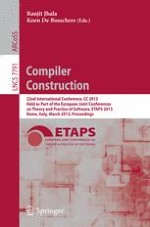2013 | Book
Compiler Construction
22nd International Conference, CC 2013, Held as Part of the European Joint Conferences on Theory and Practice of Software, ETAPS 2013, Rome, Italy, March 16-24, 2013. Proceedings
Editors: Ranjit Jhala, Koen De Bosschere
Publisher: Springer Berlin Heidelberg
Book Series : Lecture Notes in Computer Science
